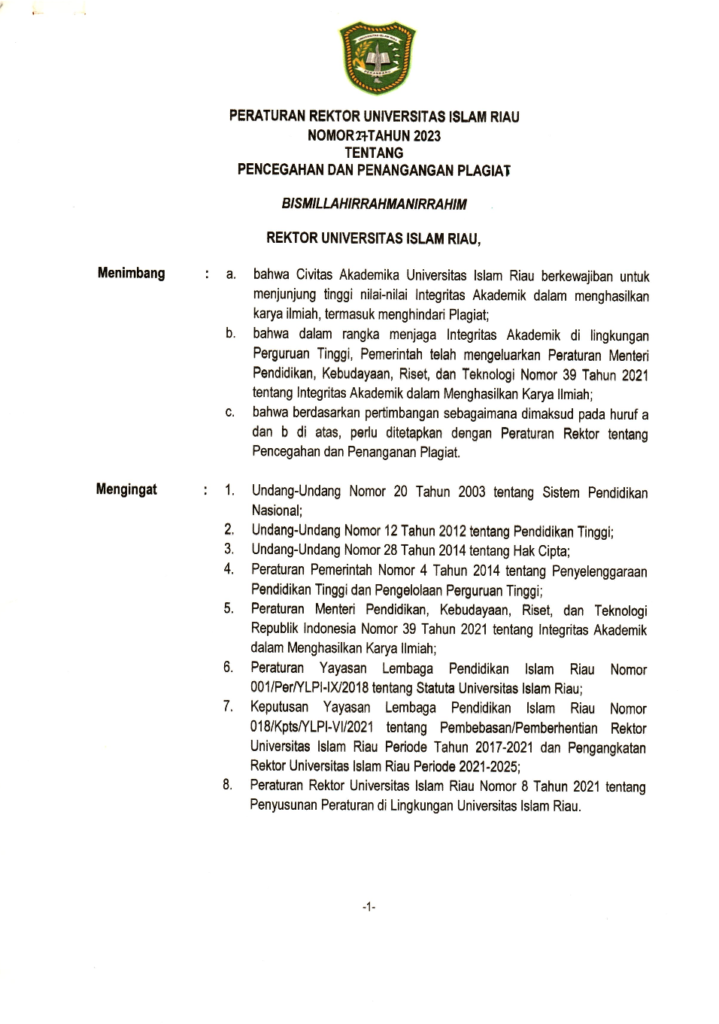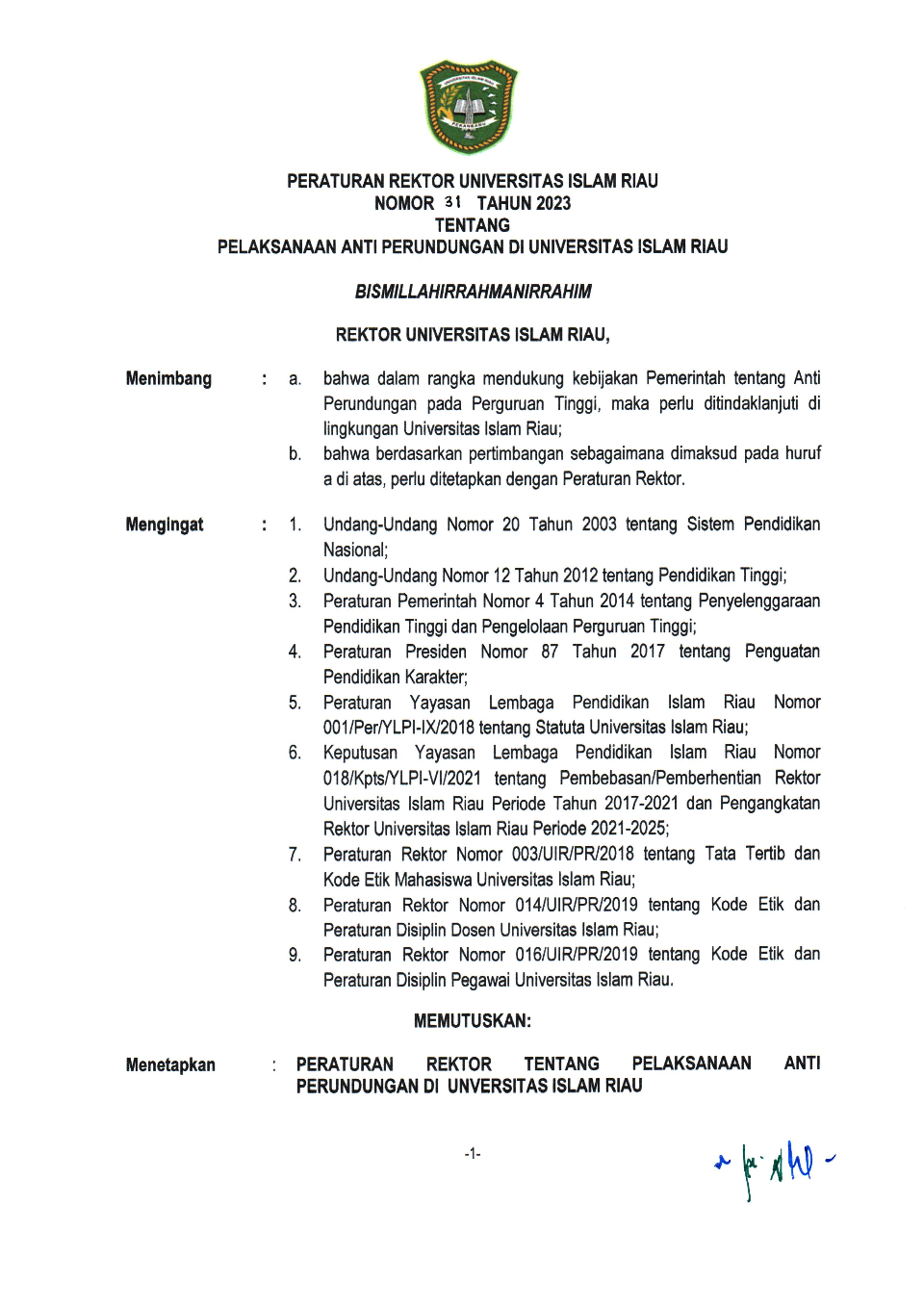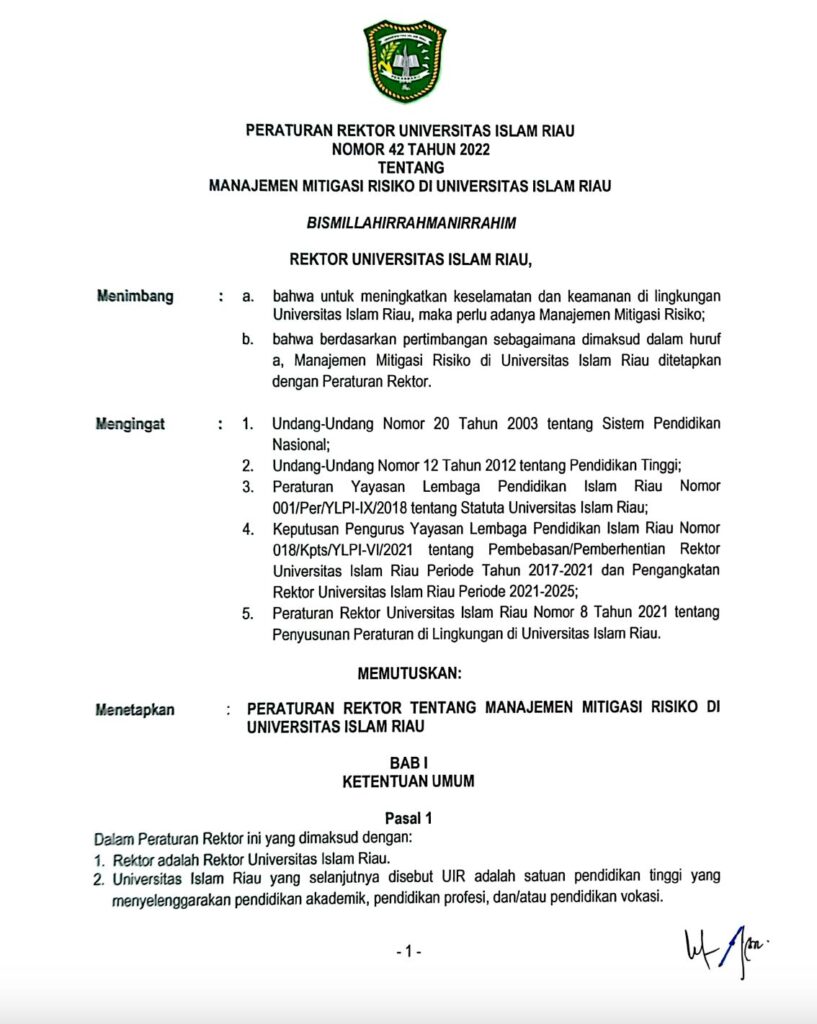Universitas Islam Riau (UIR) demonstrates a robust commitment to sustainability, providing students with a distinctive perspective on how institutions prioritize a sustainable existence. Beyond mere declarations, UIR actively seeks outward evidence of its dedication to sustainability. This commitment is exemplified by various initiatives, including the remarkable impact of UIR alumni in the fields of science and technology, where they are actively engaged in addressing climate-related challenges. These alumni serve as inspiring examples of UIR’s dedication to nurturing individuals who are equipped to make meaningful contributions towards mitigating environmental issues.
Moreover, UIR’s commitment to sustainability extends to its research endeavors, which are aligned with the United Nations’ 17 Sustainable Development Goals (SDGs). Through research projects and initiatives spanning diverse disciplines, UIR contributes to the global efforts aimed at achieving these SDGs. Whether it’s through innovative solutions addressing environmental degradation, promoting renewable energy sources, or advocating for social equity and justice, UIR’s research activities are directed towards creating a more sustainable and equitable future.
In essence, Universitas Islam Riau’s commitment to sustainability is evident not only in its rhetoric but also in tangible actions and outcomes. By fostering a culture of sustainability across its academic and research landscape, UIR empowers its students and faculty to actively participate in shaping a more sustainable world.
Universitas Islam Riau (UIR) diligently unveils its financial reports on an annual basis, courtesy of the Bureau of Finance, underscoring its unwavering commitment to transparency and accountability. The dissemination of these meticulously crafted financial reports serves as a conduit for enlightenment, enabling a diverse array of stakeholders—ranging from students and faculty to benefactors and the wider community—to delve into the labyrinth of financial operations and resource allocation mechanisms at UIR. Through the scrutiny of these reports, stakeholders are afforded a panoramic view of the financial landscape, empowering them to discern the fiscal priorities and resource utilization strategies of the university. This concerted effort not only bolsters trust and confidence but also fosters an environment conducive to constructive dialogue and informed decision-making. For those eager to peruse the detailed annual financial reports of UIR, a convenient link is provided below for easy access.
The Ethics and Law Bureau bears the weighty responsibility of overseeing general ethical considerations surrounding the teaching and research activities of the University, particularly those involving human subjects. This entails meticulously reviewing studies submitted for ethical evaluation, with a steadfast commitment to safeguarding the rights, dignity, safety, and well-being of all actual and potential participants. Furthermore, the Committee strives to offer impartial counsel to both participants and researchers, fostering an environment of ethical awareness and adherence.
Scheduled to convene on a monthly basis, typically on the first Wednesday of each month, the Committee conducts thorough deliberations on projects submitted for ethical scrutiny, ensuring rigorous adherence to ethical standards and guidelines.
In February and March of 2022, the University promulgated Regulation No. 09 and No. 10, delineating ethical guidelines and individual responsibilities within the institution. These regulations serve as pillars of ethical conduct, reinforcing the University’s commitment to upholding the highest standards of integrity and accountability. Access to the full suite of regulations is provided through the link below, offering comprehensive insight into the ethical framework governing the University’s operations.
The Senate, serving as the apex authority within the University’s governance structure, shoulders the overarching responsibility for ensuring the integrity and effectiveness of institutional operations and the actions of its representatives. This entails not only deliberating on significant policy matters brought forward by the Council or Senate members but also actively participating in the selection of key personnel for various University bodies, including the Council and the Audit & Scrutiny Committee. Additionally, the Senate holds the authority to sanction alterations or augmentations to the University’s Statutes and Regulations, which serve as the bedrock of its governance framework.
Council, comprised of representatives from each school, along with ex officio members and lay members of the Senate, assumes a pivotal role in the day-to-day administration of the University, including the prudent management of its financial resources and assets. Moreover, Council is entrusted with ensuring compliance with the regulatory requirements set forth by the Office for Students. Sessions of the Council are convened at regular intervals, with the Rector assuming the chairmanship, facilitating constructive deliberations and decisions pertaining to the University’s governance and administrative affairs.
The Research Independence/Academic Freedom Policy (University Regulation No. 29 promulgated in December of 2023) at UIR ensures that scholars and researchers have the autonomy to pursue their academic interests without interference or bias. UIR upholds this policy by fostering an environment where academic freedom is respected, allowing faculty members and researchers to explore diverse topics and methodologies without fear of reprisal or censorship.

The Prevention and Handling of Plagiarism Policy (University Regulation No. 27 promulgated in December of 2023) at Universitas Islam Riau (UIR) is a comprehensive framework aimed at upholding academic integrity and fostering a culture of originality and ethical scholarship within the university community.

This policy encompasses proactive measures to prevent plagiarism, as well as clear guidelines for addressing instances of plagiarism when they arise. At its core, the policy emphasizes the importance of respecting intellectual property rights, giving proper credit to sources, and maintaining the integrity of academic work.
To prevent plagiarism, UIR implements various educational initiatives and resources to raise awareness among students, faculty, and staff about the importance of academic honesty and proper citation practices. These may include workshops, seminars, and online tutorials on plagiarism awareness and citation techniques. Additionally, UIR provides access to plagiarism detection software to assist faculty in identifying and addressing potential instances of plagiarism in student work.
In the event that plagiarism is suspected or detected, UIR has established procedures for handling such cases in a fair and transparent manner. These procedures typically involve an investigation process to gather evidence and determine the extent of plagiarism, followed by appropriate disciplinary action if necessary. Depending on the severity of the offense, consequences for plagiarism may range from academic penalties such as failing grades or course suspension to more severe disciplinary actions.
Furthermore, UIR emphasizes the importance of providing support and guidance to students to help them understand the principles of academic integrity and avoid unintentional plagiarism. Faculty members play a crucial role in educating students about plagiarism and providing constructive feedback on academic writing to promote originality and proper citation practices.
Overall, the Prevention and Handling of Plagiarism Policy at UIR underscores the university’s commitment to upholding the highest standards of academic integrity and ensuring that all members of the university community adhere to ethical principles in their scholarly endeavors. Through a combination of prevention, detection, and disciplinary measures, UIR aims to maintain a scholarly environment where honesty, integrity, and originality are valued and celebrated.
The Sustainable Procurement/Purchasing Policy (University Regulation No. 22 promulgated in August of 2022) at UIR guides its procurement practices to prioritize environmentally friendly and socially responsible products and services. UIR sources goods and services from suppliers who adhere to sustainable practices, thereby reducing its environmental footprint and promoting responsible consumption.

The Sustainable Procurement/Purchasing Policy (University Regulation No. 22 promulgated in August of 2022) at UIR guides its procurement practices to prioritize environmentally friendly and socially responsible products and services. UIR sources goods and services from suppliers who adhere to sustainable practices, thereby reducing its environmental footprint and promoting responsible consumption.

UIR’s Sustainable Investment Policy (University Regulation No. 15 promulgated in December of 2020) outlines its commitment to investing in environmentally sustainable and socially responsible projects and enterprises. By aligning its investment portfolio with sustainability criteria, UIR supports initiatives that contribute to positive environmental and social outcomes while generating financial returns.

The Sustainable Policy on Donations and Funding (University Regulation No. 15 promulgated in February of 2022) at UIR ensures that donations and funding sources align with the university’s sustainability values and objectives. UIR accepts donations and funding from organizations and individuals committed to sustainability, supporting projects and initiatives that advance environmental conservation, social equity, and economic development.

UIR’s Modern Slavery Policy (University Regulation No. 31 promulgated in December of 2023), reflects its zero-tolerance approach towards forced labor and human trafficking. The university takes proactive measures to identify and address any instances of modern slavery within its supply chains and operations, partnering with stakeholders to promote ethical labor practices and protect human rights.

The Student Safety Policy (University Regulation No. 30 promulgated in December of 2023) at UIR prioritizes the well-being and safety of its students, providing a supportive and secure learning environment. UIR implements comprehensive safety protocols and measures across its campuses, including emergency response plans, counseling services, and campus security patrols, to ensure the safety and security of all students.

UIR’s Equality, Diversity, and Inclusion Policy (University Regulation No. 20 promulgated in August of 2022) underscores its commitment to fostering a diverse and inclusive community where all individuals are respected and valued. The university promotes equal opportunities for students, faculty, and staff from diverse backgrounds, ensuring that everyone has access to education and employment opportunities regardless of their gender, ethnicity, religion, or socioeconomic status.

The UIR Coordination Meeting convenes bi-weekly and is attended by key figures including the Rector, Vice-Rectors, Directors, Deans, Deputy Deans, Heads of Bureaus, Departments, and Laboratories. Its primary objective is to strategize, monitor, and synchronize all operational activities within UIR, ensuring cohesion and efficiency across the institution.
The minutes of these Coordination Meetings are meticulously documented and made publicly available, shedding light on pivotal collaborative initiatives undertaken by the university. Decisions formulated during the session are transparently disseminated to the entire academic community, ensuring that all stakeholders are well-informed and engaged in the university’s initiatives.
For access to the published minutes and detailed insights into the discussions and decisions made during these meetings, please click the provided link below.
Universitas Islam Riau (UIR) strategically plans and executes its strategy and risk management framework with a steadfast commitment to realizing its vision of becoming a world-class Islamic university. This ambitious goal necessitates a multifaceted approach that integrates strategic foresight, proactive risk management, and continuous improvement processes.
At the heart of UIR’s strategy lies a clear articulation of its vision, “To be a world-class Islamic University,” which serves as a guiding beacon for all strategic initiatives and decision-making processes. This vision is not merely aspirational but is underpinned by concrete goals and objectives that are SMART (Specific, Measurable, Achievable, Relevant, and Time-bound) to ensure clarity and accountability.
To translate this vision into action, UIR engages in a comprehensive strategic planning process that involves extensive stakeholder consultation, data analysis, and environmental scanning. This process enables UIR to identify key opportunities, challenges, and trends both within the higher education landscape and the broader socio-economic context. Based on this analysis, UIR formulates strategic priorities and initiatives that align with its vision and mission, leveraging its strengths and addressing its weaknesses.
Crucially, UIR recognizes that achieving its vision requires a proactive approach to risk management. Thus, the university integrates risk assessment and mitigation strategies into its strategic planning process to anticipate and mitigate potential obstacles and threats that may impede progress towards its goals. This entails identifying and prioritizing risks, developing contingency plans, and establishing robust monitoring and control mechanisms to track progress and adapt strategies as needed.
Moreover, UIR fosters a culture of innovation, entrepreneurship, and continuous improvement to drive excellence and competitiveness. The university encourages experimentation, creativity, and knowledge exchange among faculty, staff, and students, fostering a dynamic learning environment that embraces change and embraces change as an opportunity for growth.
In summary, Universitas Islam Riau employs a strategic approach to planning and executing its strategy and risk management framework, guided by its vision of becoming a world-class Islamic university. By integrating strategic foresight, proactive risk management, and a commitment to excellence, UIR strives to realize its aspirations and make a meaningful impact on society.
Risk
Mitigation Management (University Regulation No. 42 promulgated in December of
2022) at Universitas Islam Riau (UIR) is a comprehensive framework aimed at
upholding the values of faith and taqwa while ensuring the university’s
commitment to achieving its vision of becoming a world-class institution. This
framework involves identifying, evaluating, and mitigating various risks that
may impede the university’s mission, encompassing areas such as reputation,
finance, academics, and operations. By integrating rigorous risk management
processes and fostering a culture of proactive risk awareness, UIR seeks to
maintain its integrity, enhance operational resilience, and promote sustainable
growth in alignment with its core Islamic values.


Jl. Kaharuddin Nasution 113,
Pekanbaru 28284
Riau -
Indonesia
Copyright © Yayasan Lembaga Pendidikan Islam (YLPI) - Universitas Islam Riau. Developed by SIMFOKOM BOARD
Copyright © Yayasan Lembaga Pendidikan Islam (YLPI) - Universitas Islam Riau. Developed by SIMFOKOM